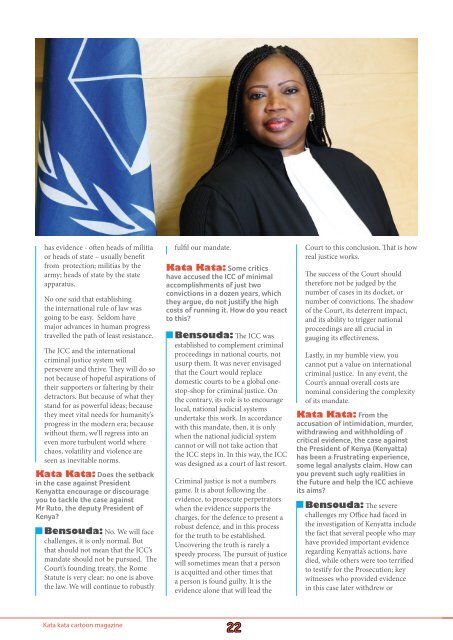2015 EDITION Vol.3 Issue 11 DIGITAL
Create successful ePaper yourself
Turn your PDF publications into a flip-book with our unique Google optimized e-Paper software.
has evidence - often heads of militia<br />
or heads of state – usually benefit<br />
from protection; militias by the<br />
army; heads of state by the state<br />
apparatus.<br />
No one said that establishing<br />
the international rule of law was<br />
going to be easy. Seldom have<br />
major advances in human progress<br />
travelled the path of least resistance.<br />
The ICC and the international<br />
criminal justice system will<br />
persevere and thrive. They will do so<br />
not because of hopeful aspirations of<br />
their supporters or faltering by their<br />
detractors. But because of what they<br />
stand for as powerful ideas; because<br />
they meet vital needs for humanity’s<br />
progress in the modern era; because<br />
without them, we’ll regress into an<br />
even more turbulent world where<br />
chaos, volatility and violence are<br />
seen as inevitable norms.<br />
Kata Kata: Does the setback<br />
in the case against President<br />
Kenyatta encourage or discourage<br />
you to tackle the case against<br />
Mr Ruto, the deputy President of<br />
Kenya?<br />
Bensouda: No. We will face<br />
challenges, it is only normal. But<br />
that should not mean that the ICC’s<br />
mandate should not be pursued. The<br />
Court’s founding treaty, the Rome<br />
Statute is very clear: no one is above<br />
the law. We will continue to robustly<br />
fulfil our mandate.<br />
Kata Kata: Some critics<br />
have accused the ICC of minimal<br />
accomplishments of just two<br />
convictions in a dozen years, which<br />
they argue, do not justify the high<br />
costs of running it. How do you react<br />
to this?<br />
Bensouda: The ICC was<br />
established to complement criminal<br />
proceedings in national courts, not<br />
usurp them. It was never envisaged<br />
that the Court would replace<br />
domestic courts to be a global onestop-shop<br />
for criminal justice. On<br />
the contrary, its role is to encourage<br />
local, national judicial systems<br />
undertake this work. In accordance<br />
with this mandate, then, it is only<br />
when the national judicial system<br />
cannot or will not take action that<br />
the ICC steps in. In this way, the ICC<br />
was designed as a court of last resort.<br />
Criminal justice is not a numbers<br />
game. It is about following the<br />
evidence, to proescute perpetrators<br />
when the evidence supports the<br />
charges, for the defence to present a<br />
robust defence, and in this process<br />
for the truth to be established.<br />
Uncovering the truth is rarely a<br />
speedy process. The pursuit of justice<br />
will sometimes mean that a person<br />
is acquitted and other times that<br />
a person is found guilty. It is the<br />
evidence alone that will lead the<br />
Court to this conclusion. That is how<br />
real justice works.<br />
The success of the Court should<br />
therefore not be judged by the<br />
number of cases in its docket, or<br />
number of convictions. The shadow<br />
of the Court, its deterrent impact,<br />
and its ability to trigger national<br />
proceedings are all crucial in<br />
gauging its effectiveness.<br />
Lastly, in my humble view, you<br />
cannot put a value on international<br />
criminal justice. In any event, the<br />
Court’s annual overall costs are<br />
nominal considering the complexity<br />
of its mandate.<br />
Kata Kata: From the<br />
accusation of intimidation, murder,<br />
withdrawing and withholding of<br />
critical evidence, the case against<br />
the President of Kenya (Kenyatta)<br />
has been a frustrating experience,<br />
some legal analysts claim. How can<br />
you prevent such ugly realities in<br />
the future and help the ICC achieve<br />
its aims?<br />
Bensouda: The severe<br />
challenges my Office had faced in<br />
the investigation of Kenyatta include<br />
the fact that several people who may<br />
have provided important evidence<br />
regarding Kenyatta’s actions, have<br />
died, while others were too terrified<br />
to testify for the Prosecution; key<br />
witnesses who provided evidence<br />
in this case later withdrew or<br />
Kata kata cartoon magazine<br />
22

















